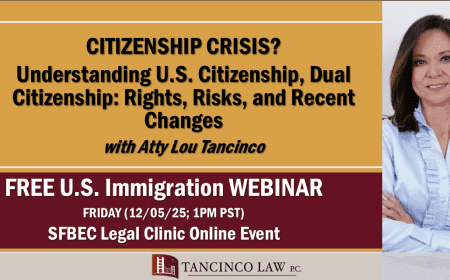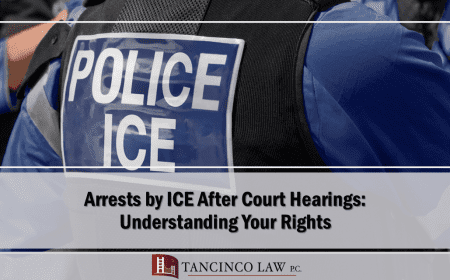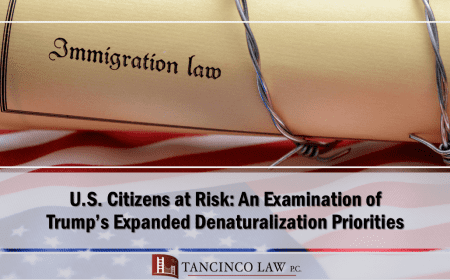2020 is a Presidential election year. Whether the United States will have a new or a re-elected President, immigrants and their families will be facing major changes in immigration policies. Let’s examine and determine the prospects of 8 major immigration policy changes that may affect our Filipino immigrants.
The Filipino World War II Veterans Parole Program (FWVP)
The FWVP program was created in June 2016 in recognition of the extraordinary contributions and sacrifices of Filipino veterans during WWII. This program allowed their family members to join the veterans or their widows in the U.S. while their visa petition is waiting for visa availability. After 3 years, several hundreds of family members were allowed in on parole under the FWVP program. As part of the administration policy to eliminate parole programs, the USCIS announced in August 2019 that it will terminate the FWVP. Advocacy groups like the Asian American Advancing Justice, FilVetRep, and the Bayanihan Equity Center, among others, have been working hard to preserve the program. This 2020, unless the administration changes its mind about terminating the program, FWVP program will end after USCIS issuance of its final rules.
Increased USCIS Fees
In November 2019, USCIS announced that it will increase fees on petitions and applications. Among the many applications that are going to be affected are (1) Adjustment of Status application, an increase from $1,225 to $2,195; (2) DACA fees will increase from $495 to $765, an overall increase of 55 percent; (3) Naturalization application will increase by 83 percent, raising the fee from $640 to $1,170. Aside from the increase in fees, USCIS is eliminating fee waivers for naturalization, adjustment of status, green card replacements and renewal and employment authorization. The increase will take effect this 2020 and only after USCIS releases its final regulations.
Backlog in Family Petitions
As of November 2019, there are 291,392 approved visa petitions on behalf of Filipino nationals filed by their US citizens or green card holder relatives, awaiting visa availability with the National Visa Center. The backlog is still severe and there is still lengthy wait for visa availability in certain preference petitions. For Filipinos with petitions under the F3 and F4 visa category, the waiting period is more or less 21 years and for those whose petitions are F1 or F2B the waiting period is approximately 11 years. There are bills (RELIEF Act, S.2603 and H.R. 5327) pending before the 116th Congress which if passed will increase visa numbers and eliminate backlogs. Until these bills are passed into law, expect decades of waiting for certain petitions on behalf of Filipino nationals.
H1B Visa
On January 9, 2020, USCIS released its regulations on the registration system for H1B visa petitions. Instead of filing a full petition for a foreign national employee, the U.S. employer must complete a registration process that requires basic information about the H1B employer and the employee being petitioned. USCIS will open registration period from March 1 through March 20, 2020. Only those selected by USCIS lottery system will be able to file H1B petitions to meet the 65,000 cap.
Public Charge
Under the law, a visa applicant will not be allowed to enter the United States if the government believes that they are likely to become public charge or reliant on government assistance. In 2019, the USCIS issued a new definition of public charge rule to include those who receive either cash or non-cash benefits like housing or health care, from the government for more than 12 months during the 3 year period. The implementation of this public charge rule is suspended because of court litigation filed by several States and advocacy groups challenging the legality of the rule. The Supreme Court is expected to rule on this case this 2020. If the public charge rule takes effect, the legal impact will be on low income legal immigrants petitioning their relatives.
Deferred Action on Childhood Arrivals (DACA)
Deferred Action on Childhood Arrivals or DACA program was created in 2012 to grant young immigrants deferred status and employment authorization. In 2017, Trump announced that it was ending DACA. This resulted in several lawsuits filed against the administration challenging the decision to terminate DACA. The case was heard by the Supreme Court in November 2019 and a decision is expected anytime before June 2020. In the meantime, DACA recipients are allowed to renew their DACA status and employment authorization.
REAL ID
Beginning October 1,2020, federal agencies including Department of Homeland Security (DHS) and Transportation Security Administration (TSA) will only accept state issued driver’s licenses that are REAL ID compliant. This means that the state licensing agency must issue REAL IDs to those with valid identification and legal status. Those who are still in unauthorized status may not be issued READ ID compliant driver’s licenses and identification that will allow them to access federal offices or travel domestically through commercial airlines.
H2B Visa
In January 2019, nationals from the Philippines were banned from receiving H2B temporary working visas for one year. As of this writing, there is no update yet from the USCIS if in 2020, the Philippines will be allowed to become beneficiaries of new H2B visas.
These 8 immigration policies are just among the many policies that are anticipated to affect our Filipino immigrant community. The enforcement of immigration law has consistently been the highest priority of the Trump administration resulting in hundreds of thousands of ICE arrest since he took oath as U.S. president. After a decade, we still have not seen a major overhaul and change in immigration law. Hopefully, this 2020 decade, our leaders will finally pass a more humane and sensible immigration reform law; a more compassionate, relevant and rational one that will replace the dysfunctional immigration system we have right now.
(Atty. Lourdes Santos Tancinco, is an immigrant advocate, founder and a principal partner at the Tancinco Law Offices, San Francisco CA based law firm. She may be reached at 1 888 930 0808, law@tancinco.com, facebook.com/tancincolaw, or through tancinco.weareph.com/old)




